I’m once again in awe of VR gaming. In an age where we’ve kind of seen it all before, where a middling game manages to impress with its visuals and new game ideas are seemingly running out, it’s not as easy to be wowed with video games as it used to be. There was a time when every new release appeared to push the industry forward in some way, and the future looked incredible. You’ll often hear people like may say things like “you’ll never again get that feeling of playing Mario 64 for the first time after growing up with the SNES,” and I think that’s mostly held true.
The leap from generation to generation has lessened – and I know we get unbelievably good-looking games these days, before someone slams me on socials – meaning I appreciate what we’ve got, but I’m not muttering things like “holy mother of Jesus!” all the time. With PlayStation VR2 I muttered that, and more. It’s hard to see Sony’s newest entry into the VR market as more than a niche product that’ll do well if it sells to 5% of the final PS5 userbase, but if you can afford it, you’ll get those wow moments that have been harder and harder to find.
Before more gushing about how I love PSVR2, a few of the things that irked me – some directly related to the hardware itself, some VR in general.
THE BAD/STUFF TO BE AWARE OF
Space
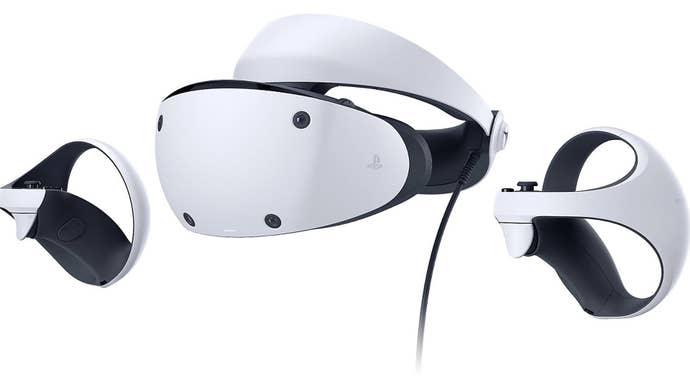
This might sound obvious, but to experience PlayStation VR2 (and VR in general) you need a large amount of open space, free from obstacles. There are multiple play modes available (what’s supported varies game by game), but the most space intensive is “Roomscale.” This play style allows more freedom of movement (actually walking around your room), but it needs a minimum of 2m x 2m.
My living room, where the TV and PS5 sit, is on the face of it big enough. It’s 4.8m x 3.3m. Throw in some sofas, a TV, table pushed to the side, and well… it’s a tight squeeze. I managed to get Roomscale working, but I had to sort of fudge the room setup (where you tell the VR unit what space you are allowed to move around in) to make it think the sofas didn’t exist.
In most games this isn’t a problem, but one of the best available (the absolutely brilliant WHAT THE BAT?), needs Roomscale to work. It’s a bit of a hassle, but I’d seriously suggest getting the tape measure out before handing over the £530. The other play styles, sitting and standing (where you’re meant to stay still but move your head and arms) require a lot less space (1m x 1m) and should be manageable for most people, unless you live in one of those sleep pod hotels, or something.
Controllers
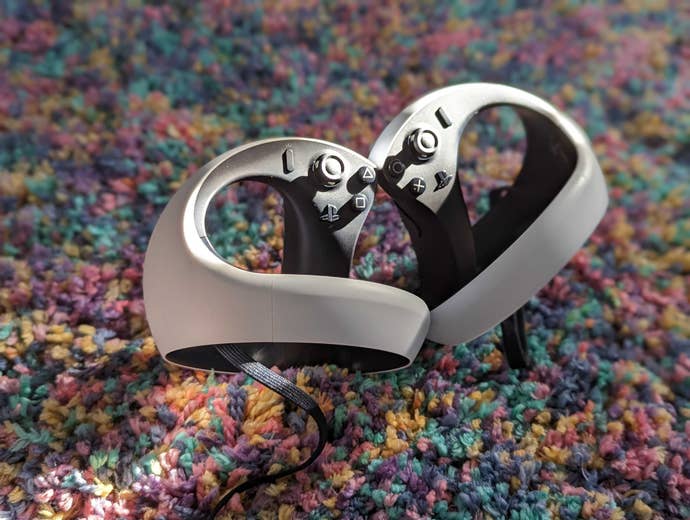
These things look funky and feel great to hold and use, but charging them is a pain. The VR2 Sense Controllers back in the feedback you get in the DualSense, which is brilliant, but I found I needed to charge them more often than ideal. If you can spare the £40 for the charging dock, I’d recommend it as you can easily make sure the controllers are always charged and ready. Without the dock you need to remember to plug each in, which I forgot to do on multiple occasions.
Motion sickness
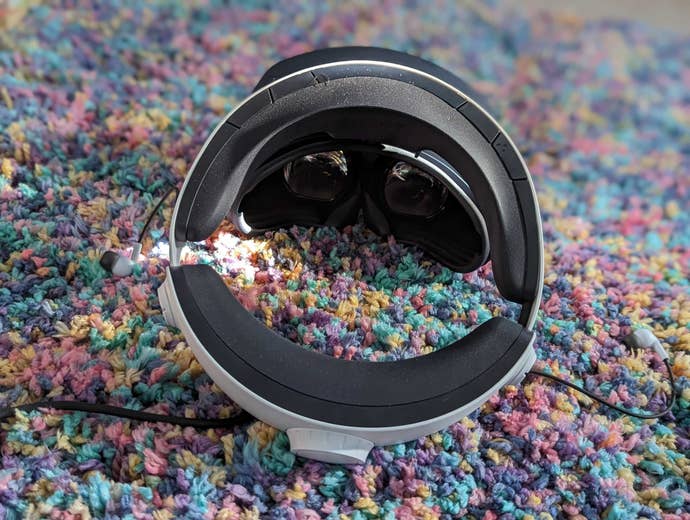
I can’t think of many things more disappointing than getting your new VR kit setup, only to find that you feel sick minutes after experiencing the wonder of Horizon Call of the Mountain. Years ago I could hardly play VR games because of this, but it’s something I’ve been able to work through to the point that it’s only a problem with really sudden, fast movements. A lot of the games let you customise your experience to lessen this problem (putting a vignette around the screen, slow walking speed, etc.), but I still get the odd moment where my brain clearly feels like it’s been pulled out of my head.
I’d say good VR is absolutely worth the effort, and for some people it’s not an issue at all. Just go steady when you first get a game where you can freely walk about using the controller, as it’s this disconnect that will do you in. Try using alternative movement options first, such as teleportation, if the game supports it. The tactile nature of the PS VR2 headset and the controllers is a big help, to me at least, but I’ve been using VR for a few years now and felt a little worse for wear after one lengthy session. If you start to feel ill, stop immediately, take a break, then come back. That’s the health part of this review done with!
There’s a wire
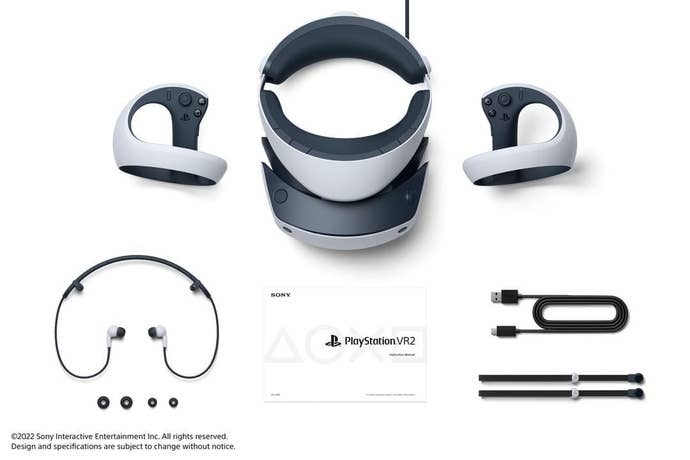
Perhaps I’ve become a little spoiled by the Meta/Oculus Quest 2 and its complete lack of wires, but going from a few years with that and the ability to grab it and put it on anywhere, to being physically tethered to your PS5, is not ideal. I never got into any trouble with the cable, which is very long, but I did notice it hitting my leg at times, and part of my brain then decided I needed to check the room to make sure I wasn’t about to accidentally lasso my legs. One button press on the headset lets you look out of the headset’s camera, so it’s pretty easy to do a safety check, but I never felt the need to do this with the Quest 2.
This also ties to the space required issue. Unless you want to move your TV and PS5 around the house every time you use the VR2, you’re pretty much stuck playing where they are rooted. In all other ways the PS VR2 destroys the Quest 2, but I think I’ll still be making use of the standalone unit when I want to play more freely in the spare room.
That’s a big chunk of “issues” but I think it’s more of a “things to note” if I’m being honest. Given the high cost of PS VR2, it’s worth knowing about the pitfalls beforehand.
THE GOOD
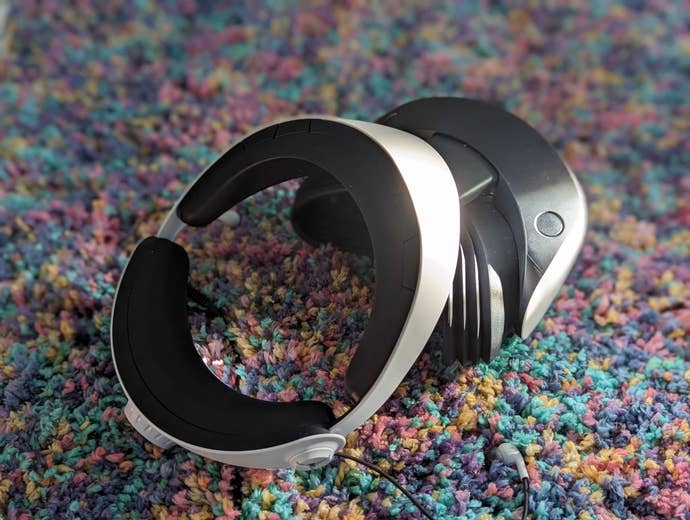
These notes aside, I can say without any doubt whatsoever that PlayStation VR2 is incredible. This article’s intro said as much, really, so that shouldn’t be a surprise. VR isn’t a perfect, finely-tuned thing yet, so issues exist, but most can be overlooked given the bigger picture. And that picture is essentially the paintings from Mario 64, and you’re jumping into them.
If you have experienced some of the PC VR space heavy hitters (Half-Life: Alyx, for example, which I’d love to see on VR2), the sense of amazement here might be lessened somewhat, but I defy anyone to sit through the opening of Horizon and not feel like they’re experiencing the future. One point early on almost saw me eat dirt, such was the sense of being there when a dramatic moment played out all around me.
It’s worth touching on the clarity of the image on PS VR2. If you’re new to VR this might come as a bit of a surprise, as while Sony’s new headset is leagues ahead of its original unit for the PS4 you’ll notice it’s not as sharp as looking at your 4K TV (if you own one). This is the best-looking image I’ve seen on a VR headset (although I haven’t used the latest PC VR sets), but you’re still jamming two tiny displays up against your eyeballs, which means things have a softer appearance than you might expect. It’s something you adjust to and sort of ignore after a while. Even so, you can easily tell you’ve been using a superior product when switching to something like the Quest 2.
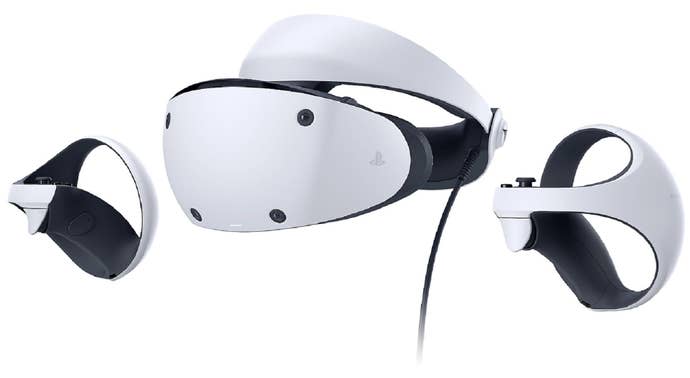
A special shout out to the audio, too. The included ear buds are decent enough and clip to the headset to avoid getting in the way, and they offer solid 3D surround sound. You’ll be better off using your own headphones, although if you have a USB set you’ll need to plug them into the PS5, so take that extra cable into account and make sure it’s long enough to stretch from the PS5 to where you’ll be playing.
As with other VR headsets, PS VR2 also lets you use a cinematic view to slap a large screen display in front of your eyes – like being at a virtual cinema. This is neat, letting you play non-VR PlayStation games and use video apps. If you’re comfortable being in VR for long periods of time this is a great way to watch films in what amounts to your own private cinema screen.
VR is all about taking you into the virtual world and PlayStation VR2 does that beautifully. Much of the value will come from the games that are developed for it, but even at launch (which isn’t packed with big-hitters, it must be said) there’s plenty to choose from. Horizon has the wow factor, Gran Turismo 7 is the core game but in VR, Resident Evil Village treads the tried and tested path that Resident Evil 7 walked so well, and smaller but no less impressive VR offerings come in the shape of Rez Infinite, Tetris Effect: Connected, What the Bat?, Job Simulator, Pistol Whip, Moss 1 & 2 Remasters, and more.
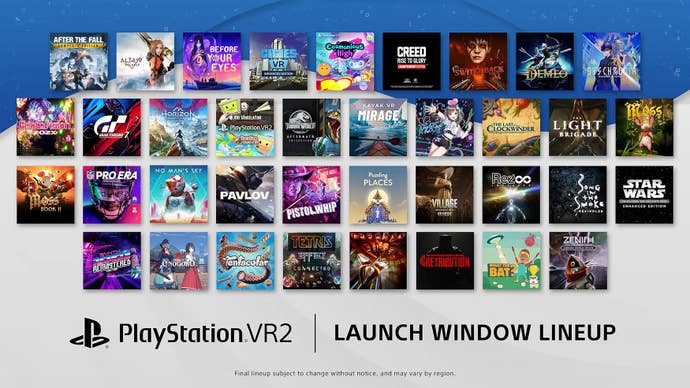
What of the future, though? Will we get God of War in VR? Spider-Man? Big game franchises aren’t everything as the best are often the quirkier titles from indie devs, but as this is Sony’s headset it’s fair enough to expect its biggest titles to appear. What about a new Astro Bot? Please! I’m sure games will come, and they need to in order to sell the PlayStation hardcore fanbase on a peripheral that costs more than the PS5 itself.
VERDICT
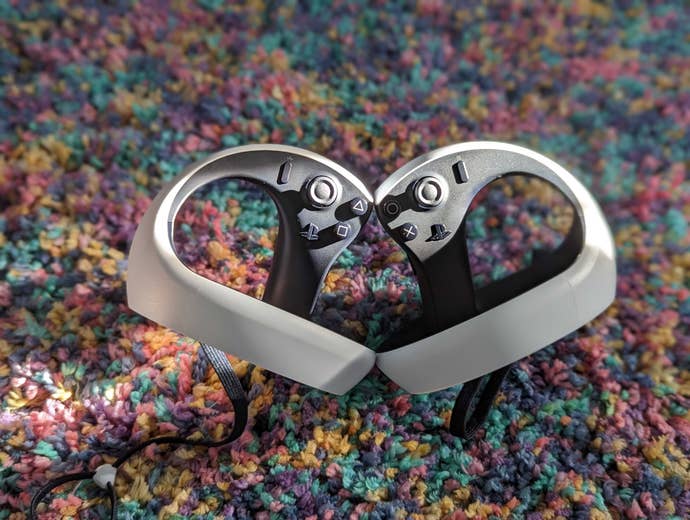
I know I’ve spent a lot of this review more or less trying to convince you not to buy the PlayStation VR2, but I just feel that you should be aware of what you’re getting. I think VR is incredible and PS VR2 is the best VR experience I’ve had in terms of hardware, but this isn’t a cheap toy you can take a gamble on – at least not for most people. It’s also hard to properly explain (or show) what VR is like to be in. You can say how immersive it is, how much of a generational leap it feels to be part of, but you can’t know until you make that leap yourself. VR isn’t going to replace traditional gaming, but it can exist on its own path alongside it – a path that, for me, is lined with excitement.
In a way not buying into PS VR2 is the easy choice to make. You can’t truly know what you’re missing until you’ve experienced it, so it’s not hard to cover your eyes and ears to what the VR world offers. Despite offering a more breathtaking experience than the PS5 (or any console) itself, it’s a hard sell. If, however, you want to be part of the cool gang that doesn’t just look into virtual worlds but actually inhabits them, £530 might end up feeling like the best money you’ve ever spent.











Add comment